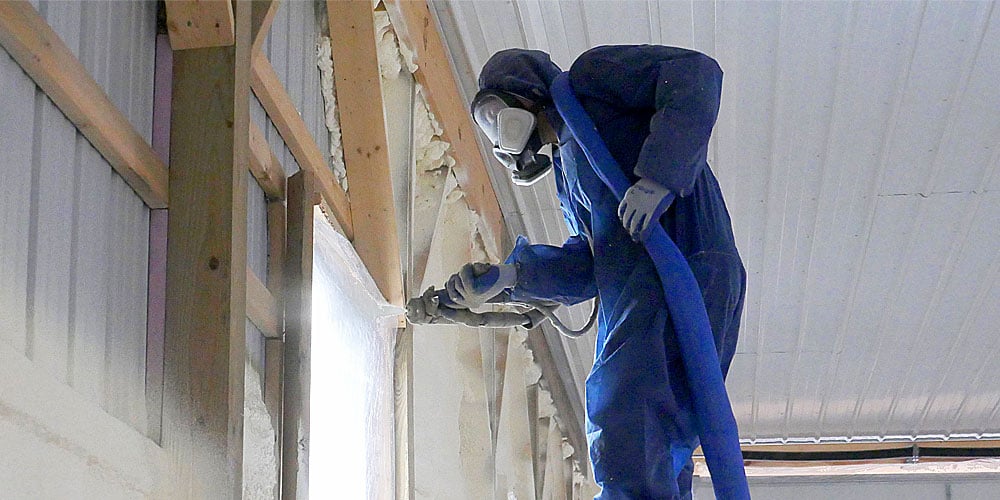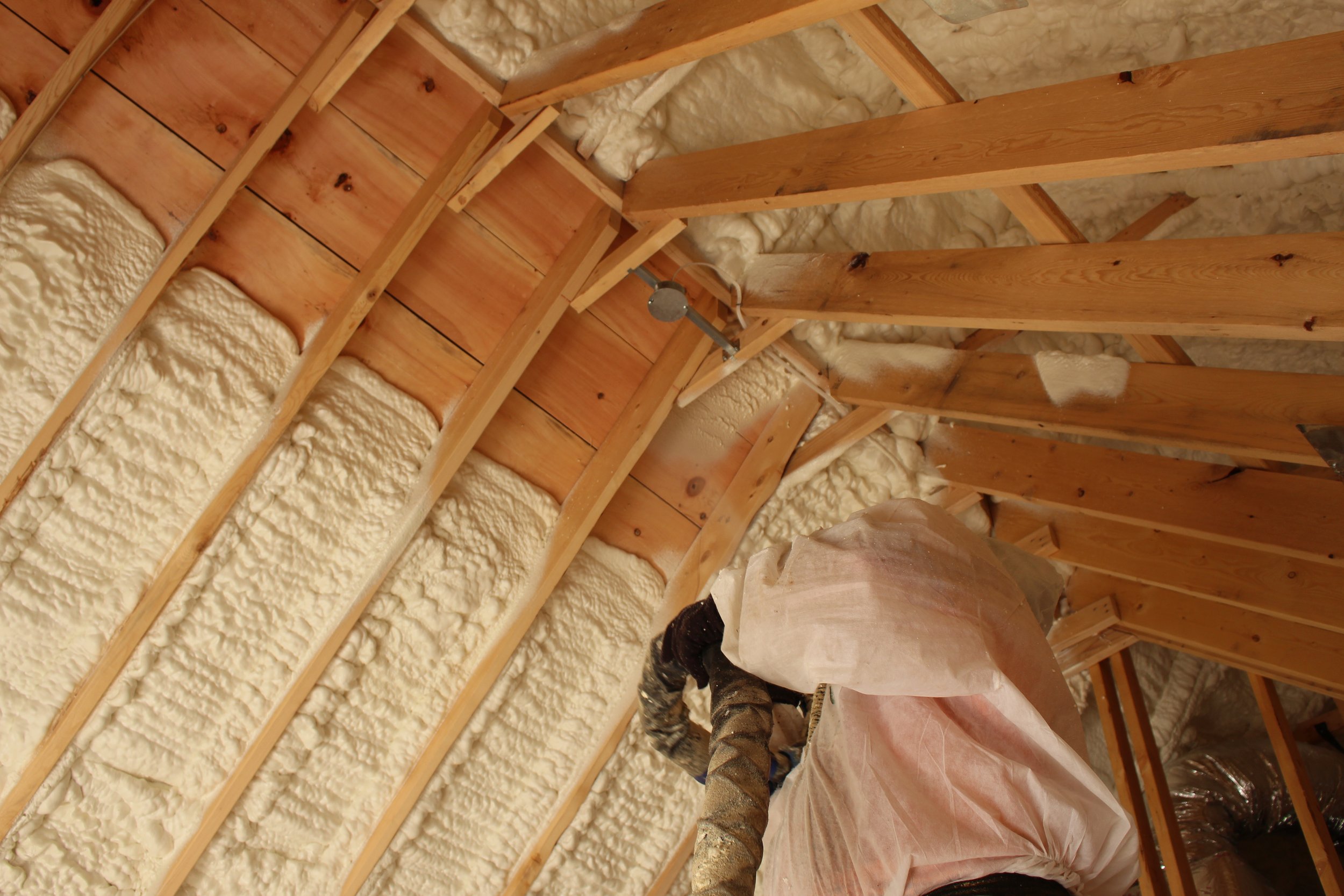Comparing Spray Foam to Conventional Insulation: Which Is Better?
Comparing Spray Foam to Conventional Insulation: Which Is Better?
Blog Article
Top Factors to Choose Spray Foam for Your Following Insulation Project
When considering insulation alternatives for your next task, spray foam sticks out due to its excellent performance features and efficiency advantages. Its exceptional R-value not just improves thermal resistance yet also adds to significant energy cost savings with time. In addition, the material's capacity to produce an impermeable seal successfully reduces air seepage and lessens the risk of moisture-related concerns, such as mold development. As you evaluate your choices, exploring the flexible applications and lasting advantages of spray foam might disclose compelling factors to incorporate it right into your insulation approach.
Superior Insulation Performance

The high R-value of spray foam, which gauges its thermal resistance, is another key advantage. Closed-cell spray foam, for circumstances, can accomplish an R-value of approximately 6.5 per inch, significantly exceeding fiberglass batts and cellulose. In addition, spray foam insulation develops an airtight seal, which reduces thermal connecting and minimizes the capacity for mold and mildew development as a result of moisture buildup.

Energy Efficiency Advantages
The power performance advantages of spray foam insulation are substantial, more enhancing its appeal as a top choice for building insulation. One of the primary advantages is its superior thermal performance. Spray foam expands upon application, creating an airtight seal that reduces air leaks, which is a common resource of power loss in typical insulation products. By properly reducing thermal linking, it keeps a regular interior temperature level, consequently reducing cooling and heating prices.
Furthermore, spray foam insulation boasts a high R-value per inch, which means it supplies a lot more thermal resistance in much less area compared to choices like fiberglass or cellulose (Spray Foam). This performance not only adds to immediate power financial savings however likewise promotes lasting sustainability by lowering the general energy intake of a building
Moreover, the application of spray foam can certify house owners for power effectiveness rewards and tax credits, including financial benefits to its energy-saving capabilities. In an age where power conservation is extremely important, choosing spray foam insulation not just enhances convenience yet likewise straightens with ecologically liable methods, making it a sensible option for both household and commercial tasks.
Dampness and Mold Resistance
Provided its one-of-a-kind composition and application technique, spray foam insulation supplies outstanding dampness and mold resistance, making it an optimal selection for numerous environments. The closed-cell structure of spray foam produces a strong obstacle that effectively seals off prospective wetness access, thereby minimizing the chance of mold and mildew growth. Unlike conventional insulation materials, which can browse this site take in water and supply a reproduction ground for mold and mildew, spray foam remains unsusceptible moisture, enhancing the overall health of the indoor atmosphere.
In addition, the application process of spray foam involves broadening and filling up voids and splits, making sure a limited seal that decreases air leakages. This characteristic not only enhances power performance but additionally helps control humidity degrees within the room. Correct moisture control is critical for protecting against mold and mildew and mold, making spray foam insulation particularly beneficial in areas prone to dampness, such as cellars and creep areas.
Along with its moisture-resistant properties, spray foam is also inherently resistant to mold and mildew growth. This characteristic guarantees that buildings and homes stay healthy and balanced and risk-free gradually, supplying comfort to homeowners and building supervisors alike.
Long-Term Expense Cost Savings
Investing in spray foam insulation returns significant lasting expense savings, primarily with improved power performance. Unlike typical insulation products, spray foam creates an airtight seal that lessens air leakage. This reduction in drafts results in reduce home heating and air conditioning prices, as HVAC systems do not have to work as hard to keep comfortable interior temperatures.
Furthermore, the remarkable insulating properties of spray foam suggest that homes continue to be regularly comfy year-round, minimizing reliance on energy-consuming home appliances. Over time, these cost savings can build up, leading to a visible decrease in energy bills.
In addition, spray foam insulation adds to the durability of your home's structure by preventing moisture accumulation and mold growth, which can result in expensive fixings. With its sturdiness and resistance to clearing up, spray foam preserves its effectiveness over the visit their website years, guaranteeing that the initial financial investment continues to repay.
Essentially, picking spray foam insulation not only boosts your home's energy effectiveness however also converts right into substantial long-lasting informative post monetary benefits, making it a smart investment for homeowners wanting to minimize prices while improving convenience and sustainability.
Versatile Application Options
Countless application options make spray foam insulation an extremely functional choice for a variety of building projects (Spray Foam). This flexibility permits it to be effectively utilized in domestic, business, and commercial setups, accommodating varied insulation requirements
Spray foam can be used in attics, walls, creep areas, and even roofings, giving seamless coverage that removes spaces and gaps where air leakages generally occur. Its ability to broaden upon application ensures a limited seal, which is crucial for power effectiveness and moisture control.
Moreover, spray foam insulation is readily available in different formulations, consisting of open-cell and closed-cell kinds, allowing for customized services based upon certain job demands. Open-cell foam is lighter and better matched for soundproofing, while closed-cell foam supplies superior insulation and structural honesty, making it ideal for areas revealed to dampness.
In addition, spray foam can be used in hard-to-reach rooms, improving its viability for retrofitting existing frameworks. With the ability to follow various substratums, consisting of timber, metal, and concrete, spray foam insulation stands out as a flexible alternative that meets the demands of modern building practices.
Conclusion
To conclude, spray foam insulation emerges as an exceptional option for insulation jobs due to its outstanding thermal resistance, power performance, and ability to develop closed seals that prevent wetness and mold development. The long-term price financial savings related to reduced energy bills even more improve its appeal. Additionally, its adaptability in application across various setups underscores its practicality and efficiency. Selecting spray foam insulation ensures a detailed solution that meets the demands of contemporary building and construction and energy performance criteria.
When it comes to accomplishing ideal power performance in household and industrial structures, spray foam insulation stands out for its superior insulation performance.The power efficiency advantages of spray foam insulation are significant, more improving its allure as a top choice for developing insulation.Investing in spray foam insulation yields significant long-term expense financial savings, primarily via boosted power performance.In conclusion, spray foam insulation arises as a remarkable choice for insulation projects due to its extraordinary thermal resistance, power effectiveness, and capability to produce closed seals that protect against dampness and mold growth. Selecting spray foam insulation ensures a thorough remedy that fulfills the demands of modern-day construction and energy effectiveness standards.
Report this page